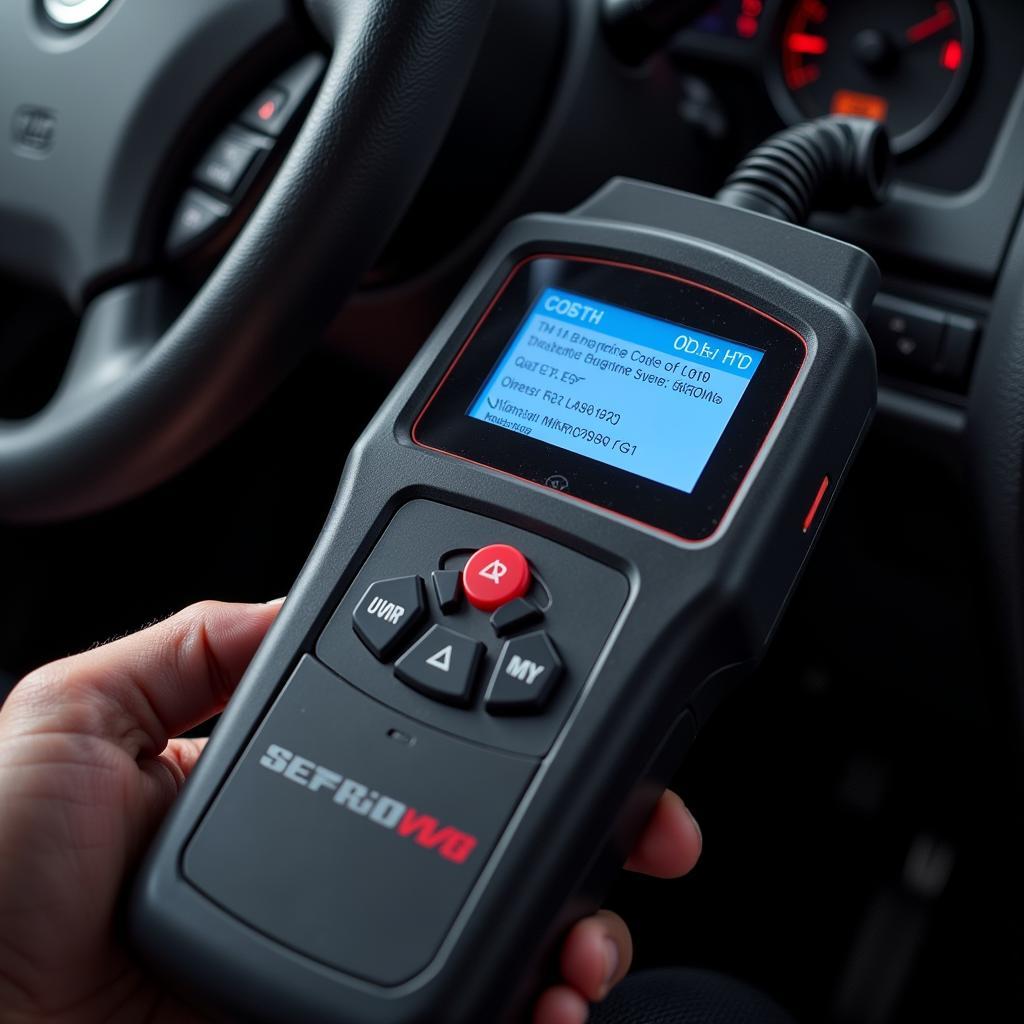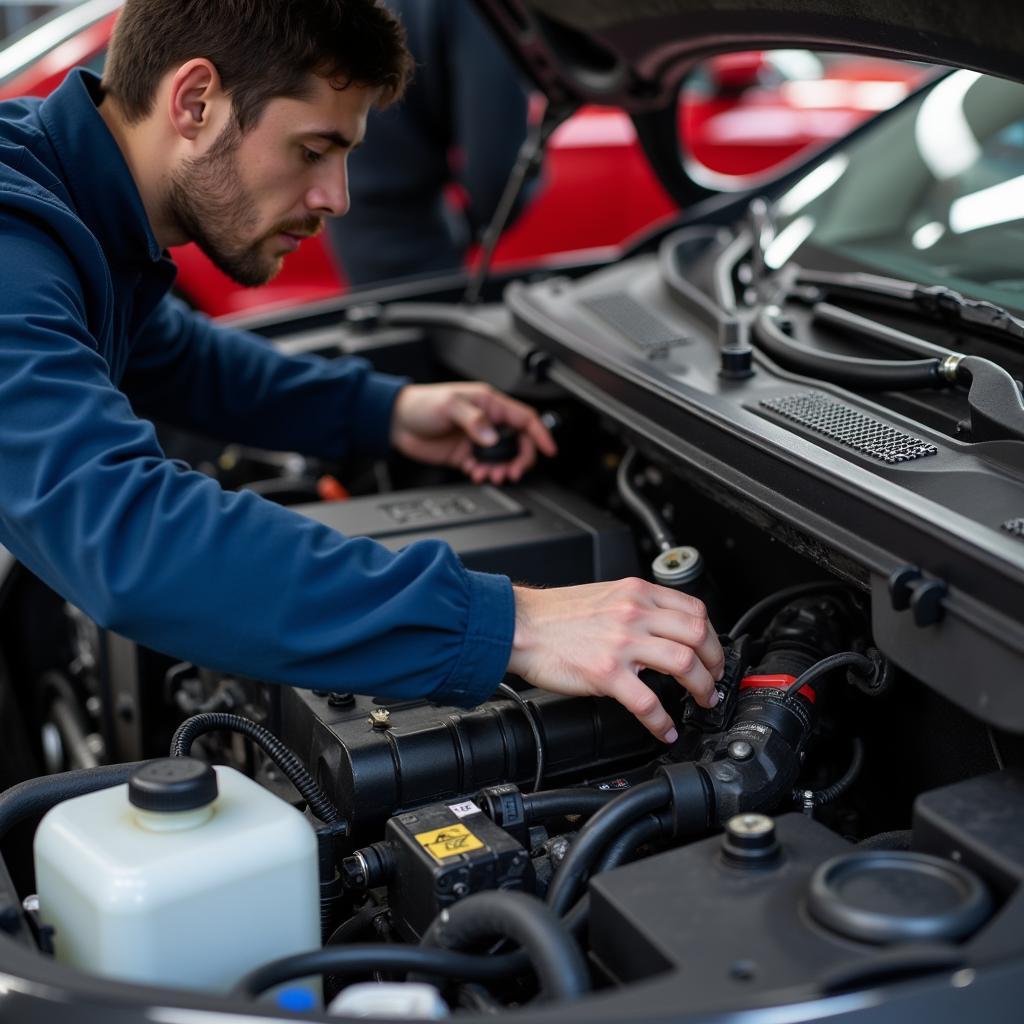A Car Engine Sensor Problem can be a real headache, leading to poor performance, increased fuel consumption, and even complete engine failure. This guide dives deep into the world of car engine sensors, helping you understand, diagnose, and potentially fix these issues. We’ll explore everything from the common culprits to advanced troubleshooting techniques. After reading this, you’ll be well-equipped to tackle your car engine sensor problems head-on.
Understanding Car Engine Sensors: The Unsung Heroes of Your Vehicle
Modern vehicles rely heavily on a network of sensors to monitor and control various engine functions. These sensors act as the eyes and ears of your car’s computer, providing crucial data to optimize performance, emissions, and fuel economy. A malfunctioning sensor can disrupt this delicate balance, leading to a cascade of problems. what causes electrical system problems in cars Understanding the different types of sensors and their roles is the first step in effectively diagnosing car engine sensor problems.
Common Types of Car Engine Sensors and Their Functions
Several key sensors play vital roles in your engine’s operation:
- Mass Airflow (MAF) Sensor: Measures the amount of air entering the engine, crucial for determining the correct fuel-air mixture.
- Manifold Absolute Pressure (MAP) Sensor: Measures the pressure inside the intake manifold, providing information about engine load and altitude.
- Oxygen (O2) Sensor: Monitors the oxygen content in the exhaust gases, helping to adjust the fuel-air ratio for optimal combustion and emissions control.
- Coolant Temperature Sensor (CTS): Measures the engine coolant temperature, influencing fuel injection and ignition timing.
- Crank Position Sensor (CKP): Determines the crankshaft’s position and speed, essential for ignition timing and fuel injection synchronization.
- Cam Position Sensor (CMP): Monitors the camshaft’s position, ensuring proper valve timing.
- Throttle Position Sensor (TPS): Measures the throttle valve’s opening angle, indicating the driver’s desired engine power.
- Knock Sensor: Detects engine knocking (detonation) and adjusts ignition timing to prevent damage.
Identifying Car Engine Sensor Problems: Symptoms and Diagnosis
A car engine sensor problem can manifest in various ways. Recognizing these symptoms is crucial for early diagnosis and preventing further damage. Common signs of a faulty sensor include:
- Check Engine Light: The most obvious indicator, often accompanied by a specific diagnostic trouble code (DTC).
- Reduced Fuel Economy: A malfunctioning sensor can disrupt the fuel-air mixture, leading to increased fuel consumption.
- Rough Idle or Stalling: Problems with sensors like the MAF, MAP, or IAC can cause unstable engine idle.
- Poor Acceleration or Loss of Power: Faulty sensors can restrict engine performance and lead to sluggish acceleration.
- Increased Emissions: A malfunctioning O2 sensor can negatively impact emissions control.
- Difficulty Starting: Issues with the CKP or CMP sensor can prevent the engine from starting.
Diagnosing the Problem: Tools and Techniques
Diagnosing a car engine sensor problem requires the right tools and approach. [electrical problems with car lights](https://autotippro.com/electrical problems-with-car-lights/) A diagnostic scanner, also known as an OBD-II scanner, is essential for retrieving DTCs stored in the car’s computer. These codes provide valuable clues about the specific sensor or system causing the issue. [what causes car electrical problems](https://autotippro.com/what causes-car-electrical-problems/) Visual inspection of sensors and wiring harnesses can also reveal damage or corrosion. A multimeter can be used to test sensor output voltage and resistance.
“A systematic approach to diagnosis is key,” says automotive expert John Smith, ASE Certified Master Technician. “Start by retrieving DTCs and then use a combination of visual inspection, testing procedures, and service information to pinpoint the faulty sensor.”
 Using an OBD-II Scanner
Using an OBD-II Scanner
Fixing Car Engine Sensor Problems: DIY Repairs and Professional Assistance
Once you’ve identified the faulty sensor, you have two options: DIY repair or professional assistance.
DIY Repairs: When to Tackle the Job Yourself
Replacing some sensors, like the MAF or O2 sensor, can be a relatively straightforward DIY task. However, accessing other sensors might require specialized tools and knowledge. Before attempting any repairs, consult your vehicle’s repair manual and ensure you have the necessary tools and expertise.
Seeking Professional Help: When to Call in the Experts
For complex sensor problems or if you’re uncomfortable working on your car’s engine, seeking professional help is the best course of action. A qualified mechanic has the experience, tools, and knowledge to diagnose and repair even the most challenging sensor issues.
 Mechanic Replacing a Car Sensor
Mechanic Replacing a Car Sensor
Preventing Car Engine Sensor Problems: Maintenance Tips
Regular maintenance can help prevent car engine sensor problems and extend their lifespan. Keep your engine clean and free of debris, and address any leaks promptly. Use high-quality fuel and oil to avoid contaminating sensors.
Conclusion: Taking Control of Your Car Engine Sensor Problems
Car engine sensor problems can be frustrating, but with the right knowledge and approach, you can effectively diagnose and resolve these issues. By understanding the different types of sensors, recognizing the symptoms of a faulty sensor, and utilizing the proper diagnostic techniques, you can keep your car running smoothly. If you need further assistance or have any questions, don’t hesitate to connect with AutoTipPro at +1 (641) 206-8880 or visit our office at 500 N St Mary’s St, San Antonio, TX 78205, United States.
FAQ: Common Questions about Car Engine Sensor Problems
- How much does it cost to replace a car engine sensor? The cost varies depending on the specific sensor and labor charges.
- Can a bad sensor damage my engine? Yes, a malfunctioning sensor can lead to various engine problems, including reduced performance, increased fuel consumption, and even engine damage.
- How often should I replace my car engine sensors? Most sensors have a relatively long lifespan, but it’s best to consult your vehicle’s maintenance schedule for specific recommendations. 96 club car charging problem
- Can I drive my car with a bad sensor? While you might be able to drive for a short period, it’s best to address the issue promptly to avoid further problems.
- How can I prevent car engine sensor problems? Regular maintenance, using high-quality fuel and oil, and addressing leaks promptly can help prevent sensor issues. ignition coil club car problems
- What are the most common car engine sensor problems? Faulty MAF, O2, and CKP sensors are among the most common issues.
- How do I know which sensor is causing the problem? Retrieving DTCs with an OBD-II scanner is the most effective way to pinpoint the faulty sensor.





Leave a Reply